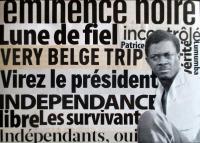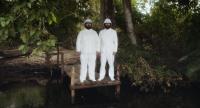Congo
Articles tagged with Congo
Tag Archive
- (For)getting
- A House in Luanda
- A Invenção do Outro
- África
- african screens
- Afrikanische Straße
- afro Americans
- anti-semitism
- antifa
- art as activism
- arte rupestre
- artes performativas
- Benjamin Lebrave
- Cameroon
- capital
- ccc
- ciberespaço
- Circulations
- Cleo Diára
- colonial war
- colonização
- communities
- Congo
- congoísmos
- criolo
- crise
- cultura visual
- cultural movement
- Dombe Grande
- economia
- epistemologia
- Flora
- funeral
- geração 80
- gkjg
- government
- história
- identity
- ideologia
- informal city
- intelectualidade brasileira
- Interwinings: peripheral arts
- Italy
- journey
- JSF #2
- justiça
- Kiluanji Kia Henda
- labor
- Language
- language policies
- lyubov matyunina
- Mais um Dia de Vida: Angola 1975
- Maputo Fortress
- Margarida Cardoso
- Marita sturken
- marroco
- Mattia Denisse
- mental health
- meteorisation
- microeconomics
- movies
- musseque
- nature
- Negro. mulheres
- oppresed
- Pedro Maurício Borges
- pele
- photographic heritage
- political agendas
- post-colonial contemporary art
- postcolonial
- pscianálise
- Rabbit Hole
- race
- rap
- René Tavares
- representações de áfrica
- Resem Verkron
- Resgate
- Ryszard Kapuscinski
- security
- series
- Sertões
- sex discrimination
- silence song
- sociolinguistic milieu
- South Africa
- spaces of invention
- Sueli Duarte
- Super Camões Richard Zenith
- Trump
- Uanhenga Xito
- Urbanization in Africa
- Violence against civilians in nigeria
- visual Arts
- Walter Salles
- woman
- World Philosophies
- x
- zines
 On June 30, 1960, at the ceremony for the proclamation of independence of the Congo, there were three speeches: from King Baudouin of Belgium, the former colonizing power, the President of the Congo, Joseph Kasavubu, and Patrice Lumumba, Prime Minister, the latter in an intervention not foreseen in the initial protocol. It was a short speech of about twelve minutes, written in an accessible and incisive language, performative and visual, a speech that, as the historian Jean Omasombo Tshonda defends, "founds the independent Congo". The first eight minutes are the clearest definition of what colonialism is from the point of view of a continent, a country, a community, a person.
On June 30, 1960, at the ceremony for the proclamation of independence of the Congo, there were three speeches: from King Baudouin of Belgium, the former colonizing power, the President of the Congo, Joseph Kasavubu, and Patrice Lumumba, Prime Minister, the latter in an intervention not foreseen in the initial protocol. It was a short speech of about twelve minutes, written in an accessible and incisive language, performative and visual, a speech that, as the historian Jean Omasombo Tshonda defends, "founds the independent Congo". The first eight minutes are the clearest definition of what colonialism is from the point of view of a continent, a country, a community, a person.  By systematically deconstructing the travel logs and journals of European explorers, scientists and traders who wandered through tropical Africa in the late 19th century, proves that these documents were often idealized or inaccurate and that, most of the time, these Europeans were in a permanent state of ecstasy caused by the disease, high doses of quinine, alcohol, opiates and other drugs.
By systematically deconstructing the travel logs and journals of European explorers, scientists and traders who wandered through tropical Africa in the late 19th century, proves that these documents were often idealized or inaccurate and that, most of the time, these Europeans were in a permanent state of ecstasy caused by the disease, high doses of quinine, alcohol, opiates and other drugs.  When the Africans discovered that the mato inspired such horror in the Portuguese, they made it their habitual refuge, patiently negotiating from there with the intruders. Queen Njinga, in Angola, played this game to perfection, thus provoking the increasing anger of the Portuguese. Referring to the subterfuges the Portuguese governor opposed to the liberation of her sister, prisoner in Luanda, she wrote on 13 December 1655: “For these and other betrayals I took shelter in the matos, far from my territories” (Cadornega 1972, II: 501). By withdrawing to the forest, the queen was not only obeying a military imperative, but also putting pressure on the Portuguese.
When the Africans discovered that the mato inspired such horror in the Portuguese, they made it their habitual refuge, patiently negotiating from there with the intruders. Queen Njinga, in Angola, played this game to perfection, thus provoking the increasing anger of the Portuguese. Referring to the subterfuges the Portuguese governor opposed to the liberation of her sister, prisoner in Luanda, she wrote on 13 December 1655: “For these and other betrayals I took shelter in the matos, far from my territories” (Cadornega 1972, II: 501). By withdrawing to the forest, the queen was not only obeying a military imperative, but also putting pressure on the Portuguese. 
